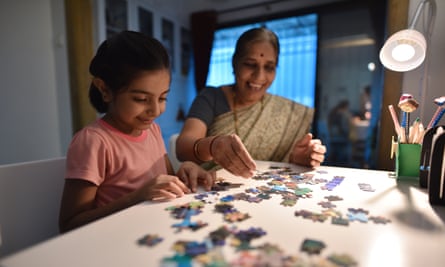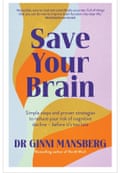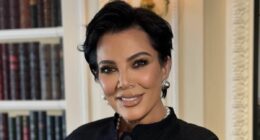
‘Excellent evidence that this works’: how mind experts protect their brains
While sleep and exercise are top priorities, strict diets and supplements aren’t essential in most academics’ routines
Brain health can be a heavy subject. By midlife many of us are caring for parents or in-laws affected by dementia. It’s a stark reminder of our own brains’ vulnerability. That’s not to mention the ocean of information that exists on the subject, so deep that sifting through it all can be its own brainteaser. How much sauerkraut, really, should we be eating? Must we cut out drinking completely? Do those brain training games really do anything?
In my book, Save Your Brain, I try to demystify these tips by speaking to 22 mind experts from around the world. They share their advice, of course, but they also share something far more revealing: their own practices when it comes to brain health. Here’s what I learned.
Exercise – and do it properly
Everyone I spoke to exercises. And we’re not talking slow strolling once a week. Dr Rebecca Thurston – a professor from the University of Pittsburgh whose research covers brain ageing in women – works out six days a week. Her regime is structured, and involves a mix of cardio, strength training, yoga and online Hiit exercises.
Prof Victor Henderson, a neurologist at Stanford, does a combination of aerobic and resistance exercise between two and four times a week.

A more DIY approach suits others. Dr Trevor Chong, a neuroscientist at Melbourne’s Turner Institute for Brain and Mental Health, opts for a home routine, using exercise equipment for half an hour of movement each night.
It doesn’t have to be high-impact exercise, either – something as “easy” as gardening can also make for an effective workout. Dr Dimity Pond is a medical professor at the University of Newcastle – and a practising general practitioner. She’s also a passionate gardener: a hobby that keeps her active alongside daily walks. “I’ve walked half an hour a day, five days a week, for the past 10 years,” she says.
The heart matters
Most experts see a GP regularly to keep their hearts in good health. Chong, a parent of young kids, is proactive in going to the doctor, and plans to monitor then aggressively treat any vascular risk factors that may emerge.
Food for thought
Most experts I talked to watch what they eat, but few are dogmatic about their diets. Chong tries to avoid too much meat or processed food, while others – like Thurston – follow a Mediterranean diet filled with seafood, legumes, fruits and vegetables.
Rachel Buckley, assistant professor of neurology at Harvard, chooses intermittent fasting. “I’ve been on the 5:2 for eight years,” she says.
Buckley carries a gene with definite links to Alzheimer’s disease, so warding off dementia is critical. With fasting, she eats normally for five days of the week and restricts her intake the other two days. Weight loss has never been the goal – instead she was drawn in by longevity data coming out of animal studies and data around famines.
Now, as a mum of two young girls, she doesn’t eat in daylight hours on Mondays and Thursdays but enjoys a normal dinner. “I don’t want my girls to think I’m dieting.”
Drinking, smoking and other vices
None of the experts smoke. Drinking, however, is a different story: by and large, everyone continues to imbibe in moderation, or if they’re teetotal, it’s for reasons unrelated to brain health.
READ RELATED: How can I end a strained friendship as gently as possible? | Ask Annalisa Barbieri
Chong, for example, sticks to the recommended 10 standard drinks a week and spreads them evenly across Friday, Saturday and Sunday nights. Prof Ian Hickie – a director at the University of Sydney’s Brain and Mind Centre and a co-host of the popular Minding Your Mind podcast – drinks a small amount of alcohol with a meal or at social events.
Others, like Henderson, drink less, but indulge in different ways. Henderson has just two standard drinks a week. But he loves his coffee and has four to five cups a day, half of which are decaf. Buckley, meanwhile, has totally cut out caffeine – but more to combat migraines than for brain health.
Sleep is serious
Getting seven to eight hours of quality shut eye per night is top of mind for all experts. Henderson, despite his caffeine intake, has no trouble sleeping: he’s naturally good at it.
Not everyone is so lucky. Thurston has struggled with sleep from time to time. When insomnia hits, she uses CBT-I – a form of cognitive behavioural therapy targeted to insomnia – as a remedy.
Brain training
Working out your mind is just as important as working out your body. Of course, due to the nature of their professions, the experts already have an upper hand on this one. All credit their work with keeping their brains and social lives active. Henderson is still working at a university – a very social place to work – in his 70s.

Some take an intentional approach outside of academia. Henderson is an avid reader. “I prefer that to watching late night TV shows,” he says, “and the ads for supplements that won’t help.” Thurston practises mindfulness meditation most days, though the length of time varies.
For those who have them, grandkids are a constant source of joy and inspiration. Hickie socialises with his grandchildren regularly, while Pond credits hers for challenging her brain. “I don’t have time for brain exercises,” Pond says. Instead, she has a book club and schedules regular catch-ups with friends.
To supplement or not to supplement?
The jury’s out on this one. Many – like Henderson, Hickie and Chong – decry supplements as ineffective. Chong cites insufficient evidence for their influence on brain health.
Those who do use supplements mostly agree on vitamin D – which Buckley and Thurston both take. Pond says she takes vitamin D for her bones, as well as fish oil supplements for her joints, but no specific brain health supplements.
A final word

These messages may be boring, but they can essentially be distilled to: just keep healthy. It’s not a secret magic pill, it’s not an ancient mysterious cure – it’s the stuff doctors say all the time, whether it’s to help you prevent high blood pressure, diabetes, cancer or dementia.
As Chong so eloquently puts it: “People dismiss this advice as ‘motherhood statements’, like the GP just dishes this advice out because they have to say something, and they’re sick of hearing it. But there’s excellent evidence that this works.”
-
Save Your Brain by Dr Ginni Mansberg is available now through Murdoch Books
Source: Health & wellbeing | The Guardian





